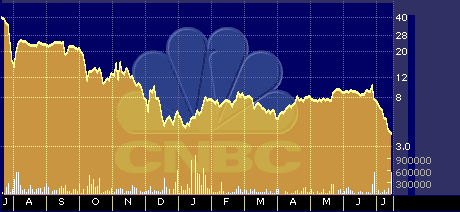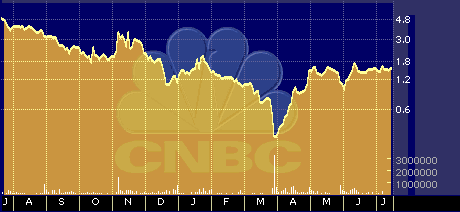
Extensity IPO Gets Explosive Start
Extensity IPO Gets Explosive Start
by Hal Plotkin
Silicon Valley Correspondent
Extensity Inc.’s {EXTN} initial public offering gives investors an early chance to bet on a technology that will become ubiquitous in the years ahead: managing employee business expenses.
“The market they are in is pretty much starting from ground zero. And it’s going to be huge,” says Robert Kugel, an analyst with FAC/Equities, based in Burlingame, Calif.
The IPO itself has so far been huge, with the stock opening at 71 earlier Thursday and quickly jumping past 80. The company priced its 4 million share offering at $20 a share late Wednesday, up from its latest range of $16 to $18 and an original zone of $8 to $10.

Extensity Post-IPO Stock-Performance Chart
Emeryville, Calif.-based Extensity makes software that automates employee expense accounting, business travel documentation, billable time capture and calculation, procurement processes, and benefits programs, among other applications.
The company’s products are part of an e-business software niche analysts refer to as “workforce optimization software.”
An estimated $90 billion will be spent on e-business software through 2003, with about $18 billion of that generated by the type of applications sold by Extensity, according to International Data Corp., based in Framingham, Mass.
“It’s a very intriguing market,” says Eric Upin, managing director at Robertson Stephens, based in San Francisco. “There is very little software out there that has been designed for the employee. Most of it’s designed for business. As a pure opportunity, it’s an area that is really underserved.”
While Extensity’s software is aimed at helping employees manage activities such as expense reporting and benefits calculations more easily, Upin notes that the savings to employers are often quite substantial.
It costs employers, for example, an average of $7.60 in labor costs alone to manually process an individual employee expense report, compared with just $1.29 per report if the process is automated, according to a recent study by the Hackett Group, based in Hudson, Ohio. On average, companies process about 20,000 expense reports per $1 billion in annual revenue, according to the same firm.
“It’s not a macho, testosterone-driven area like procurement,” Upin says. “But it can make a real difference.”
Upin adds that increasingly complex employee-benefit packages, which often include stock options, a variety of savings and pension plans and group purchasing discounts, are contributing to the need for the type of software produced by Extensity.
“There are plenty of efficiencies to be gained in those areas,” says Chris Sergeant, vice president of research analysis at Craig-Hallum Capital Group Inc., based in Minneapolis. “You can make a very good stock idea on interoffice efficiencies alone. You’re talking about a five or six times reduction in costs.”
Extensity is facing a number of rivals in the marketplace, most notably Redmond, Wash.-based Concur Technologies Inc. {CNQR}, and Captura Software Inc., a privately-held firm based in Bothell, Wash.
Concur’s stock suffered a setback last October when the company missed its fourth-quarter numbers. The stock has bounced back up since then, however, due largely to overall optimism about the growth of the workforce optimization software market.

Concur Technologies 52-Week Stock-Performance Chart
But Kugel says, “I don’t think any of them has a big lead over the others.”
In the future, though, analysts say it’s likely at least some larger competitors that are currently focused on more sizable e-commerce application areas, such as Oracle Corp. {ORCL}, Peoplesoft Inc. {PSFT}, and SAP AG {SAP}, will eventually turn their attention to Extensity’s chosen market niche.
“Increased competition may result in price reductions, reduced margins and loss of market share, any one of which could seriously harm our business,” Extensity warns in its S-1, the firm’s formal pre-IPO filing with the Securities and Exchange Commission.
In the meantime, though, analysts say Extensity is benefiting from its early embrace of Java, a programming language developed by Sun Microsystems Inc. {SUNW}, which is designed to make it easier to use software by making it possible to run software on any type of computer.
That means employees using Extensity software can, for example, fill out expense reports while offline, say, by using their laptop computer aboard an airplane. The information is then downloaded to an employer’s database once the employee reconnects to the Internet.
“A year or two ago Java was a selling point against Extensity,” Kugel says. “It was new and was viewed with a great deal of suspicion by IT [information technology] people. There were also some real performance problems with Extensity software at one point. But that’s all been dealt with now.”
Kugel says Extensity’s Java-based application has, more recently, been winning over corporate buyers. “It turns out Extensity made the right decision to make Java the cornerstone of its application,” he says. “The ability to fill out expense reports offline is something you can’t do with any of the other competing applications. That will change over time, but it isn’t there just yet. For a lot of professional service organizations, though, Java is now an absolute requirement.”
Extensity posted a loss of $15 million on revenue of $4.05 million for the nine months ended Sept. 30, compared with a loss of $7.3 million on revenue of $725,000 for the same period a year earlier.


